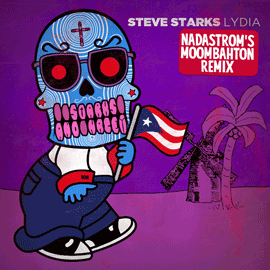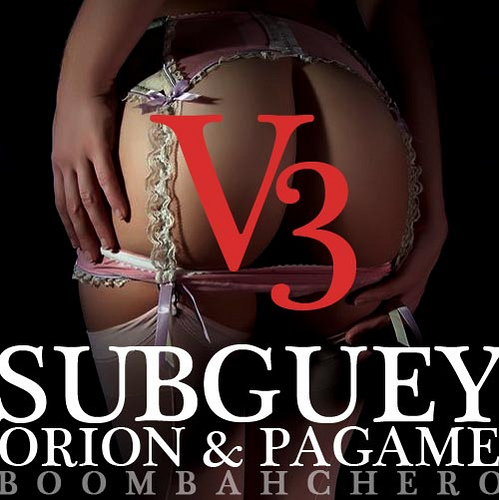Moombahton, Boombahchero and 21st-century genre meltdown | reviews, news & interviews
Moombahton, Boombahchero and 21st-century genre meltdown
Moombahton, Boombahchero and 21st-century genre meltdown
Some days I feel like I've woken up on the other side of some wormhole in the spacetime continuum, and the world is a subtly but definitely different place to yesterday. So it was last week when I got a slightly drunken email from a music producer in Rotterdam, with some remixes of his work, saying, “There was this dude called DJ Orion and this dude was working in his lab on his freak creation. Mixing moombahton with footwork and guarachero at 140 bpm. He named it: boombahchero.”
OK, “footwork” I know. Footwork is a rhythmically warped mutation of house music and hip hop that comes from Chicago, soundtracks startling dance contests there, and is currently very fashionable in some underground European clubs. “Guarachero”, I was vaguely aware, is a kind of Mexican folk-techno fusion; not something I'd delved deeply into, but not exactly hyper-obscure either. But “moombahton”? “MOOMBAHTON”? This is a genre? I thought I knew about club music, where on earth did this ridiculous word spring from?
The sound of moombahton:
So I Googled. And fell down the rabbit hole. Yes, moombahton is a genre, and an established one at that: a radically slowed-down version of populist Dutch electro-house that arose by chance at a house party for mainly Latino kids in Washington DC in autumn 2009, and has since spread back to Holland and on to various places from Australia to Brazil, where people with knock-off software make their own moombahton versions of big dance hits - all online, with no "official" releases. It is pronounced “moom-bah-tone”, as it takes its name from a fusion of “Moombah” - a key Dutch house record – and “reggaetón” (pron “reggae-tone”) which is a globally popular Puerto Rican style, itself a fusion of Jamaican dancehall, hip hop, salsa and other Latin forms.
 All of which is enough to make anyone's head spin; but this is how genre works in 21st-century club music. While certain styles like dubstep and minimal techno take root slowly and spread inexorably, elsewhere there is a constant hyper-speed splintering and recombination going on, with crossbreed styles able to blossom worldwide in the blink of an eye, connecting unhip and highly specific geographical and cultural points based purely on similarities in what dancers react to in the strobe-lit darkness.
All of which is enough to make anyone's head spin; but this is how genre works in 21st-century club music. While certain styles like dubstep and minimal techno take root slowly and spread inexorably, elsewhere there is a constant hyper-speed splintering and recombination going on, with crossbreed styles able to blossom worldwide in the blink of an eye, connecting unhip and highly specific geographical and cultural points based purely on similarities in what dancers react to in the strobe-lit darkness.
And that specificity is crucial; this is not a homogenisation of culture or geography, but an endless interplay of very particular references from third world and first world alike against one another, governed by the tastes of young artists and dancers for whom minute shifts in tempo, timbre or syncopation are instantly noticeable and instantly reacted to. To risk Pseud's Corner, it's Jacques Derrida's “play of signifiers” come vividly to life in the digital cultural fabric; post-Modernism's wildest dreams come true.
Will it amount to anything? Well, dubstep over the last decade has shown that even in the fast-moving wired world, a hybrid nano-genre with no more than a few hundred fans can incubate over several years then become globally significant – so you never know: any one of these bizarre recombinant forms might take root, anywhere in the world, and become something major.
 And is it any good? I just don't know any more, I'm still feeling old and slow in the face of all this whirl of information – and in any case, can you even judge such utilitarian sound-making on any realistic aesthetic terms? A new variant makes people dance or it doesn't, and it survives and recreates itself purely on that basis. That said, although some of the Mexican samples do get a bit cheesy, one “boombahchero” track in particular, DJ Orion's version of Munchi's “Pun Ain't Dead” - using samples of corpulent (and dead) Puerto Rican rapper Big Pun to punctuate relentless bendy electronic noises and snippets of accordion – has an enormous amount of rude vitality to it and I can't stop listening to it. So I guess I like it. Frankly I'm confused, and a little bit nervous as to what comes next.
And is it any good? I just don't know any more, I'm still feeling old and slow in the face of all this whirl of information – and in any case, can you even judge such utilitarian sound-making on any realistic aesthetic terms? A new variant makes people dance or it doesn't, and it survives and recreates itself purely on that basis. That said, although some of the Mexican samples do get a bit cheesy, one “boombahchero” track in particular, DJ Orion's version of Munchi's “Pun Ain't Dead” - using samples of corpulent (and dead) Puerto Rican rapper Big Pun to punctuate relentless bendy electronic noises and snippets of accordion – has an enormous amount of rude vitality to it and I can't stop listening to it. So I guess I like it. Frankly I'm confused, and a little bit nervous as to what comes next.
Share this article
more New music
 theartsdesk on Vinyl: Record Store Day Special 2024
Annual edition checking out records exclusively available on this year's Record Store Day
theartsdesk on Vinyl: Record Store Day Special 2024
Annual edition checking out records exclusively available on this year's Record Store Day
 Album: Pearl Jam - Dark Matter
Enduring grunge icons return full of energy, arguably their most empowered yet
Album: Pearl Jam - Dark Matter
Enduring grunge icons return full of energy, arguably their most empowered yet
 Album: Paraorchestra with Brett Anderson and Charles Hazlewood - Death Songbook
An uneven voyage into darkness
Album: Paraorchestra with Brett Anderson and Charles Hazlewood - Death Songbook
An uneven voyage into darkness
 theartsdesk on Vinyl 83: Deep Purple, Annie Anxiety, Ghetts, WHAM!, Kaiser Chiefs, Butthole Surfers and more
The most wide-ranging regular record reviews in this galaxy
theartsdesk on Vinyl 83: Deep Purple, Annie Anxiety, Ghetts, WHAM!, Kaiser Chiefs, Butthole Surfers and more
The most wide-ranging regular record reviews in this galaxy
 Album: EMEL - MRA
Tunisian-American singer's latest is fired with feminism and global electro-pop maximalism
Album: EMEL - MRA
Tunisian-American singer's latest is fired with feminism and global electro-pop maximalism
 Music Reissues Weekly: Congo Funk! - Sound Madness from the Shores of the Mighty Congo River
Assiduous exploration of the interconnected musical ecosystems of Brazzaville and Kinshasa
Music Reissues Weekly: Congo Funk! - Sound Madness from the Shores of the Mighty Congo River
Assiduous exploration of the interconnected musical ecosystems of Brazzaville and Kinshasa
 Ellie Goulding, Royal Philharmonic Concert Orchestra, Royal Albert Hall review - a mellow evening of strings and song
Replacing dance beats with orchestral sounds gives the music a whole new feel
Ellie Goulding, Royal Philharmonic Concert Orchestra, Royal Albert Hall review - a mellow evening of strings and song
Replacing dance beats with orchestral sounds gives the music a whole new feel
 Album: A Certain Ratio - It All Comes Down to This
Veteran Mancunians undergo a further re-assessment and reinvention
Album: A Certain Ratio - It All Comes Down to This
Veteran Mancunians undergo a further re-assessment and reinvention
 Album: Maggie Rogers - Don't Forget Me
Rogers continues her knack for capturing natural moments, embracing a more live sound
Album: Maggie Rogers - Don't Forget Me
Rogers continues her knack for capturing natural moments, embracing a more live sound
 theartsdesk at Tallinn Music Week - art-pop, accordions and a perfect techno hideaway
A revived sense of civilisation thanks to dazzlingly diverse programming
theartsdesk at Tallinn Music Week - art-pop, accordions and a perfect techno hideaway
A revived sense of civilisation thanks to dazzlingly diverse programming
 Album: Lizz Wright - Shadow
Brilliant album from superlative vocalist
Album: Lizz Wright - Shadow
Brilliant album from superlative vocalist
 Album: Shabaka - Perceive its Beauty, Acknowledge its Grace
A quiet and reflective breakthrough
Album: Shabaka - Perceive its Beauty, Acknowledge its Grace
A quiet and reflective breakthrough

Add comment